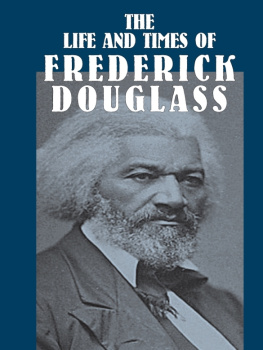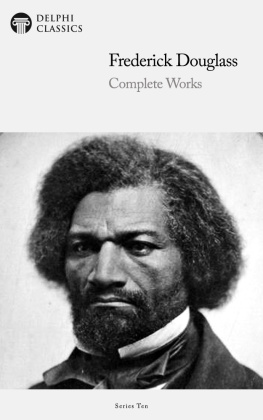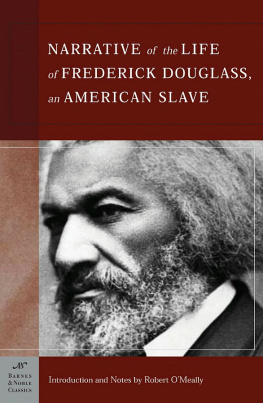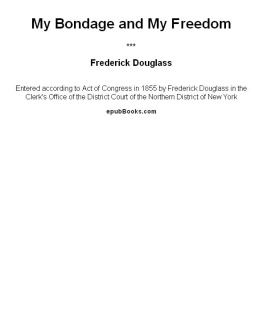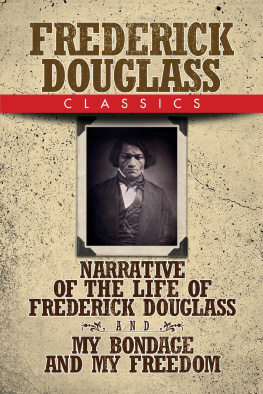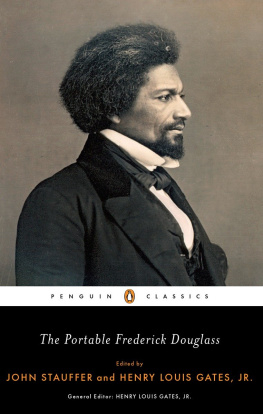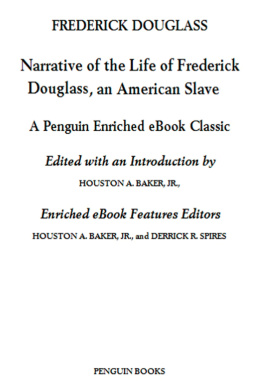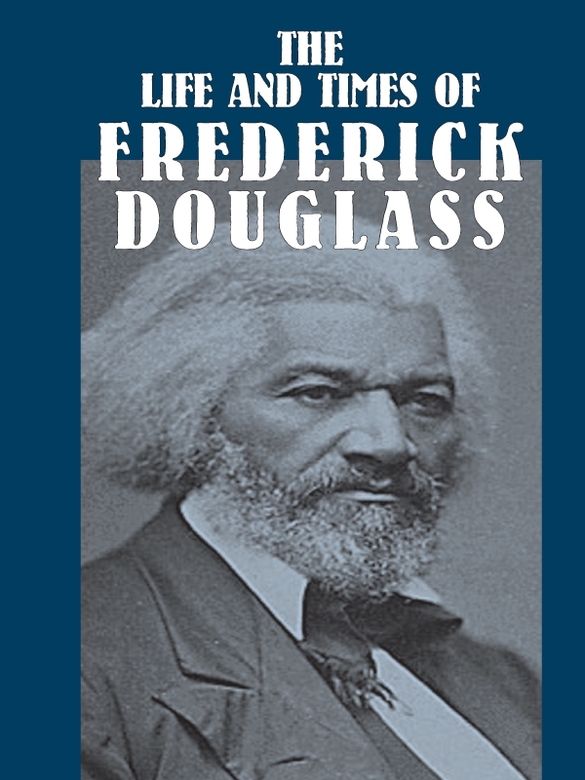Annotated Bibliography
FREDERICK DOUGLASS, despite his eminence, has been the subject of only six full-length biographies.
The best is Benjamin Quarles Frederick Douglass, Washington, The Associated Publishers, Inc., 1948. Professor Quarles, a trained historian who wrote with the perspective of a half century after Douglasss death, gave a balanced account which portrayed him as neither a demi-god nor a demagogue. Dr. Quarles, by skillful use of manuscript collections of contemporary newspapers and magazines, of the writings of Douglasss contemporaries, of general works, and of the Holland, Washington and Chesnutt biographies mentioned below, revealed clearly the important role of Douglass in many aspects of American history from 1817 to 1895. The illustrations include reproductions of Douglass, his first and second wives, and the monument in Rochester. An extensive, well-organized but unannotated bibliography and a topical index complete a scholarly work worthy of the greatest Negro of the nineteenth century, one of the great Americans of that time.
Frederick Douglass (Boston: Small, Maynard & Company, 1899), was a long essay by Charles W. Chesnutt, who achieved greater fame as a writer of fiction than as an historian. Chesnutt stated his credo in the Preface:
The more the writer has studied the records of Douglasss life, the more it has appeared to his imagination and his heart. He can claim no special qualification for this task, unless perhaps it be a profound and in some degree a personal sympathy with every step of Douglasss upward career. Belonging to a later generation, he was only privileged to see the man and hear the orator after his lifework was substantially completed, but often enough then to appreciate something of the strength and eloquence by which he impressed his contemporaries.
Frederick May Holland set forth even more strongly his appraisal in the Preface to Frederick Douglass: The Colored Orator (New York and London: Funk & Wagnalls Company, 1891, rev. ed., 1895). Holland proclaimed his plain duty to try and vindicate Douglass, even at the expense of a great philanthropist [William Lloyd Garrison] whom all delight to honor. Like Quarles, Holland used manuscript materials and secondary sources in order to explain some of the more important issues discussed in the Life and Times. Hollands biography included personal reminiscences related by Douglass which make this avowedly partisan work fascinating reading.
Booker T. Washingtons Frederick Douglass (Philadelphia and London: George W. Jacobs & Company, 1906) reveals the authors ambivalent interpretation of Douglass. The latter died six months before Washingtons famous Atlanta Compromise Address, September 18, 1895, which emphasized conciliation with the white South. In the Preface, Washington erroneously stated that Douglasss career falls almost wholly within the first period of the struggle in which this problem [of the Negro] has involved the people of this country,the period of revolution and liberation.... We are at present in the period of construction and readjustment. Many animosities still survived despite changes that would remove, or at least greatly modify, these lingering animosities. True to the conciliatory approach which Washington had advanced at Atlanta, he added: This book will have failed of its purpose just so far as anything said here shall serve to revive or keep alive the bitterness of those controversies.
In fact, Washington devoted three chapters to the postCivil War period. He quoted Douglasss oft-repeated statement: If the Negro knows enough to fight for his country, he knows enough to vote; if he knows enough to pay taxes to support the government, he knows enough to vote. Washington, as in his Atlanta address, regretted the fact that a large number of untrained Negroes had entered politics after the Civil War. But in the biography Douglass named a few of the most prominent Negro members of Congress during the Reconstruction period and deplored the fact that in recent years, students and writers of the Reconstruction period, have indulged in a good deal of unmerited abuse of the colored politicians (pp. 258, 280281). Washington praised Douglasss early interest in vocational training and blamed him for taking for his second wife a white woman.
Quite different in tone is Philip Foners The Life and Writings of Frederick Douglass in four volumes (New York: International Publishers, 19501955). Each volume begins with a biographical sketch of his life during the period covered by that volume. The volumes include practically all the important writings by Douglass. Copious footnotes make this work well-nigh indispensable despite the strong Marxist interpretation of the author and editor.
Shirley Grahams There Was Once a Slave reveals her approach in the subtitle, The Heroic Story of Frederick Douglass. Published by Julian Messner, Inc., New York, 1947, this very readable book won the publishers Award for the Best Book Combating Intolerance in America.
John W. Thompsons An Authentic History of the Douglass Monument (Rochester: Rochester Herald Press, 1903) gives a complete account of the funeral services in Rochester and of the ceremonies at the unveiling of the monument. Booker T. Washington sent a letter expressing his regret at not being able to attend and stating that Mr. Douglass is still our hero. Theodore Roosevelt, then Governor of New York, declared: There is a great lesson taught by the life of Frederick Douglass, a lesson we can all of us learn; not merely from the standpoint of his relations with his colored race, but his relations with the state. The lesson that was taught by the colored statesman was the lesson of truth, of honesty, of fearless courage, of striving for the right; the lesson of disinterested and fearless performance of civic duty.
There is still much which could be written about Frederick Douglass as manuscript letters and documents, iconographic materials and memorabilia of various kinds come to light in research centers. A recent acquisition, from a member of the Douglass family, of books, pamphlets, photographs, newspaper clippings and related ephemeral materials by the Negro Collection at Howard University, supplements the Douglass collections at his Cedar Hill home, the National Archives and elsewhere.
CHAPTER 1
Authors Birth
IN TALBOT County, Eastern Shore, State of Maryland, near Easton, the county town, there is a small district of country, thinly populated, and remarkable for nothing that I know of more than for the worn-out, sandy, desertlike appearance of its soil, the general dilapidation of its farms and fences, the indigent and spiritless character of its inhabitants, and the prevalence of ague and fever. It was in this dull, flat, and unthrifty district or neighborhood, bordered by the Choptank River, among the laziest and muddiest of streams, surrounded by a white population of the lowest order, indolent and drunken to a proverb, and among slaves who, in point of ignorance and indolence, were fully in accord with their surroundings, that I, without any fault of my own, was born, and spent the first years of my childhood.
The reader must not expect me to say much of my family. Genealogical trees did not flourish among slaves. A person of some consequence in civilized society, sometimes designated as father, was, literally unknown to slave law and to slave practice. I never met with a slave in that part of the country who could tell me with any certainty how old he was. Few at that time knew anything of the months of the year or of the days of the month. They measured the ages of their children by spring-time, winter-time, harvest-time, planting-time, and the like. Masters allowed no questions concerning their ages to be put to them by slaves. Such questions were regarded by the masters as evidence of an impudent curiosity. From certain events, however, the dates of which I have since learned, I suppose myself to have been born in February, 1817.

